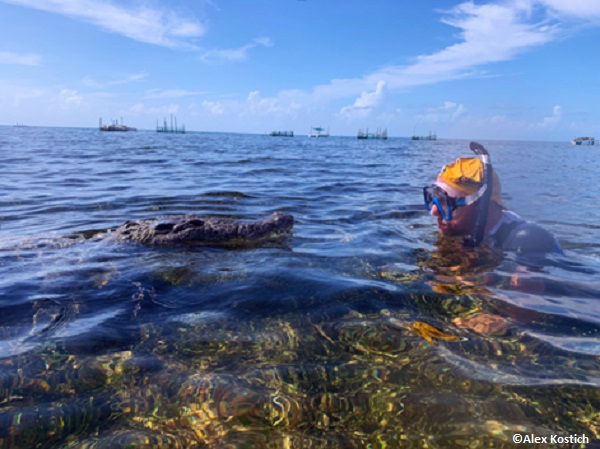No, harassing a shark for fun is not ethically equivalent to scientific research that helps conserve a species
Last month, I wrote an article for Scientific American that I shouldn’t have had to write. In it, I argued that riding, poking, prodding or otherwise harassing a free-swimming large predatory animal for fun is a bad idea. I do mean “argued;” believe it or not, there are people who strongly disagree with me. In my article, I was very general and diplomatic, and I took pains to avoid naming names.
However, my article was at least partially inspired by the disrespectful, potentially dangerous, and very public behavior of one person: the editor of Shark Diver magazine, Eli Martinez. Eli recently wrote an article for Medium, in which he stated that: “Look, I have no problem with touching sharks and I do not have any problem with other people touching sharks.” He also notes that ” I just think riding sharks is disrespectful to the animals .” He has also shared the following photos (and many, many more like them) on his Facebook page, photos showing behavior he does not seem to consider disrespectful.
When my article was shared with Eli, he noted on Facebook that some scientists don’t like him harassing sharks, and he doesn’t like scientists hurting sharks for research, so we should just agree to disagree. He has since expanded this logic into a new article for Medium, provocatively titled “those damn shark tags,” saying:
” I know that some researchers don’t think much of us Shark Diver’s feeding sharks or interacting, or touching them and that’s ok. It is good that we can agree to disagree, debate is healthy. What should matter is that we all love sharks, each in our own way”
No. I do not agree to disagree. Not all viewpoints are equivalent. Harassing a shark for fun is not ethically equivalent to scientific research that is necessary to conserve a threatened species. It just isn’t. Obviously, scientists need to take great care to minimize the stress to the animals we study (and almost all do, see our lab’s animal welfare website as one example). However, tagging research is necessary to get data that managers need to conserve, manage and protect sharks, and it is significantly less harmful to sharks than many activists seem to believe.
As I noted in my Scientific American article,![]() the growth of safe, responsible and respectful shark ecotourism has helped shark conservation. While Eli’s experience with sharks reduces the chance of an injury resulting from this behavior, at the end of the day, you’re dealing with a wild animal that is more than twice as long as you are, the behavior of a wild animal can sometimes be unpredictable, and it only has to be unpredictable once to be a problem. Additionally, putting these photos out there in the public view the way Eli does greatly increases the chance that an inexperienced diver will attempt to copy him.
the growth of safe, responsible and respectful shark ecotourism has helped shark conservation. While Eli’s experience with sharks reduces the chance of an injury resulting from this behavior, at the end of the day, you’re dealing with a wild animal that is more than twice as long as you are, the behavior of a wild animal can sometimes be unpredictable, and it only has to be unpredictable once to be a problem. Additionally, putting these photos out there in the public view the way Eli does greatly increases the chance that an inexperienced diver will attempt to copy him.
In the meantime, I continue to dream of a future where I won’t have to say things like “hey, maybe you shouldn’t poke the large predator.”
This article inspired a series of in-depth conversations on other social media platforms. Here is a list of frequently asked questions, as well as my responses to them.
Click to read more of Mr. Shiffman’s work.
And follow him on Twitter https://twitter.com/WhySharksMatter


